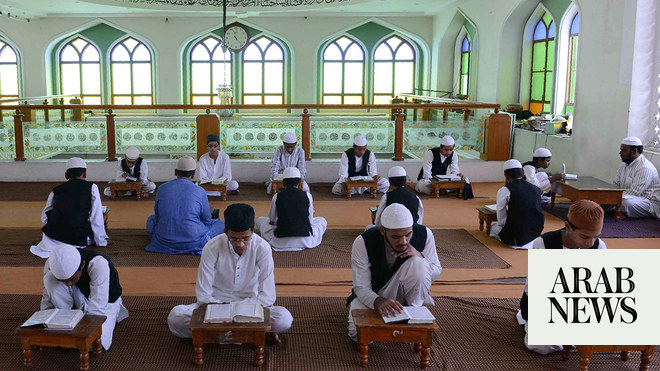
There are 2.6 million students and about 25,000 Muslim religious schools in Uttar Pradesh
Article 30 of India’s Constitution guarantees the right of minorities to run educational institutions
NEW DELHI: India’s top court overturned on Tuesday an order that banned Islamic schools in Uttar Pradesh, effectively permitting over 2 million students in the country’s most populous state to return to their studies in madrasas.
Islam is the second-largest religion in Uttar Pradesh, accounting for some 20 percent of its 230 million population.
In March, Uttar Pradesh’s Allahabad High Court scraped a 2004 law governing madrasas in the state, saying it violated India’s constitutional secularism and ordering that students be moved to conventional schools. The Supreme Court put it on hold in April after receiving petitions challenging the order.
Tuesday’s ruling by the top court will allow about 2.6 million students and 10,000 teachers to return to the 25,000 Muslim religious schools operating in the northern Indian state.
“The Allahabad High Court erred in holding that the madrasa law had to be struck down for violating basic structure, which is the principle of secularism,” Chief Justice D.Y. Chandrachud said in court. “The constitutional validity of a statute cannot be challenged for violation of the basic structure of the Constitution.”
Article 30 of India’s Constitution guarantees the right of minorities to establish and administer educational institutions.
“The Madrasa Act is consistent with the positive obligation of the state to ensure that students studying in recognized madrasas attain a level of competency which will allow them to effectively participate in society and earn a living.”
Madrasas provide a system of education in which students are taught the Qur’an, Islamic history and general subjects like math and science.
In states governed by Prime Minister Narendra Modi’s Bharatiya Janata Party, such as Uttar Pradesh and Assam, authorities have been converting hundreds of madrasas into regular schools.
“This is a landmark judgment and puts a brake to all the negative campaigns that have been going on against madrasas across the country,” Wahidullah Khan, secretary-general of the All-India Teachers Association Madaris Arabia, told Arab News.
“For us, it’s a big relief. It provides a new lease of life to thousands of madrasas across the country. The Islamic schools have been taking care of the basic education of millions of Muslims across the country and we were under lots of pressure because of the communal campaign against Muslims and their educational institutions.”
With over 200 million Indians professing Islam, Hindu-majority India has the world’s largest Muslim-minority population.
Indian Muslims have faced increasing discrimination and challenges in the past decade, accompanied by tensions and riots ignited by majoritarian policies of the Hindu right-wing BJP since it rose to power in 2014.
“We were waiting for this kind of verdict. It’s quite welcoming and relieving for the Muslim community,” Iftikhar Ahmed Javed, BJP member and former chairman of the Uttar Pradesh Board of Madrasa Education, told Arab News.
“The judgment brings relief to all,” he said. “There has been a systematic attempt to stigmatize the Islamic schools over the years and brand them as vicious, but the ruling of the Supreme Court should now stop this negative campaign.”












